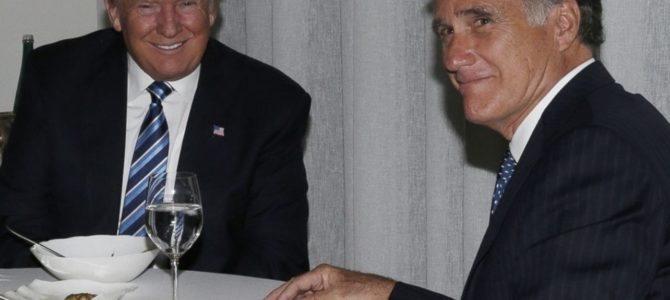We can debate whether Mitt Romney is a hypocrite for seeking the campaign endorsement of Donald Trump and then attacking the president in Romney’s first week on the job. Yet, whether the politically malleable Romney sought Trump’s help or a cabinet position, there’s nothing unprincipled about a senator taking critical positions against the president. One just wishes those criticisms made sense.
Now, Romney’s central grievances about Trump’s character are fair enough. But for some of us, the beatification of the presidency—always a problem, but a particularly unhealthy one since 2008—is off-putting, as well.
“To a great degree,” Romney writes, “a presidency shapes the public character of the nation. A president should unite us and inspire us to follow ‘our better angels.’” Personal morality matters because it reflects the temperament and choices of the people running government. The president isn’t our Pope, however. And political “unity” has always been a vacuous and destructive concept. Elected officials don’t define our national, much less personal, character. And if you’re searching for enlightenment in politics, you should probably find a better religion.
This is why I tend to think it wouldn’t hurt to have a highly competent, non-ideological, milquetoast bureaucrat as president. It would be nice, yes, if voters were offered candidates who met both their legislative and spiritual needs. Yet policy can often be a moral concern that trumps candidates’ personal predilections and failures. If it weren’t, every American voter would have been forced to abstain from casting a ballot in 2016.
Even setting this aside, Romney takes his case for moral leadership in a very curious direction. Take foreign policy: “In a 2016 Pew Research Center poll, 84 percent of people in Germany, Britain, France, Canada and Sweden believed the American president would ‘do the right thing in world affairs,’” writes Romney. “One year later, that number had fallen to 16 percent.”
So what? Romney knows well that changing European opinion almost certainly has less to do with Trump’s “character” than with the Euro-centric policies of Barack Obama, the man who mocked Romney for referring to Russia—a nation that’s suddenly taken on the greatest significance for Democrats—as our top geopolitical foe. George W. Bush, unsurprisingly, was also unpopular among Europeans.
The question is: Would Romney keep the United States in, say, the Iran deal because the citizens of Germany thought it was the right thing to do? The chaste French trusted that Obama “would do the right thing” because his administration had a penchant for treating climate change as more dangerous than Islamic terrorism and for entering into international agreements that had the United States picking up the check for other nations’ activities.
While Obama had the approval of the Swedish people when signing the Paris agreement, he did not have the approval of the U.S. Senate, part of his habitual attempts to circumvent the Constitution. Romney also supported the Paris agreement, which makes his pleas for the “rule of law” somewhat suspect.
Romney also casually throws in lines like, “We want a unified and strong Europe, not a disintegrating union.” We do? What poll shows us that Americans give one whit about a “unified” Europe? And what does that have to do with “public character” or the “rule of law?”
“Our leaders must defend our vital institutions despite their inevitable failings: a free press, the rule of law, strong churches, and responsible corporations and unions,” Romney warns. All of this intimates that Trump’s chaotic administration and bombastic rhetoric has undermined the free press or the rule of law. Despite all the hysterics in Washington these days, it’s debatable that the administration has been more detrimental to the Constitution than the opposition has.
Whether government should have a vital role in making sure corporations are “responsible”—usually a euphemism for technocratic intrusions or higher taxes—is also debatable. In fact, in many ways it is the central political debate of our time.
Of course the media will now demand that the Utah senator vote against the conservative agenda items he’s been pretending to support for decades or risk being called out as a charlatan and a Trump lackey. This intellectually preposterous proposition has become a favorite among liberals and some NeverTrumpers. But it seems unlikely that Romney, in a safe seat, will be transforming into Jeff Flake, who often embraced a self-serving policy by voting against issues he once supported to spite the president or gain favor with Washington press corp.
After all, Romney concedes he agrees with Trump on cutting taxes, rolling back excessive regulations, cracking down on “China’s unfair trade practices,” reforming criminal justice, and appointing judges who adhere to the Constitution. Since this is the bulk of Trump’s policy legacy, Romney, like many others, is primarily concerned with the tone and aesthetics of the president—or “the politics of anger and fear,” which he seems to believe originates mostly from his own side. That’s fine. It’s when he conflates criticism of Trump’s character with the Left’s dishonest framing of his policies that Romney becomes unconvincing.









